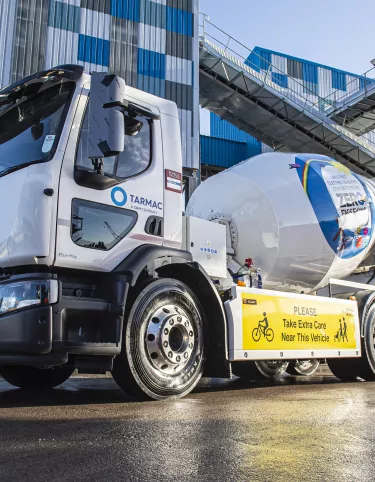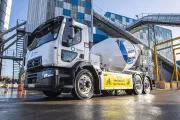Welcome to Renault Trucks UK
Press release
UK’s first all-electric mixer demonstrates pathway to low carbon logistics
Construction
Apr. 6 2023

The UK’s first all-electric ready-mix concrete mixer has successfully completed a three-month trial of commercial deliveries across Birmingham for Tarmac, marking a significant step on the path to net zero construction.
The ‘e-mixer’, created in partnership with Renault Trucks and TVS Interfleet, is the first of its kind to operate anywhere in the UK with zero tailpipe emissions. With the same average capacity as a conventional diesel vehicle, it is expected to save 42 tonnes of CO2 annually, with zero emissions per mile compared to 1.55 kg of CO2 per mile for its fossil fuel equivalent .
The mixer forms part of Tarmac’s strategy to develop integrated low carbon logistics by offering decarbonised transport for the last mile of a construction project. Operating out of the company’s rail-fed Birmingham Plant at Washwood Heath, it builds on Tarmac’s extensive logistics network which includes more than 60 rail connected sites across the UK.
Ben Garner, Tarmac’s low carbon logistics lead, said: “We have committed to being at the forefront of implementing low CO2 transport and logistics solutions and the successful operation of this e-mixer is a significant milestone for both Tarmac and the UK construction sector.
“Our extensive logistics capabilities and strong collaborative relationships with supply chain partners enable us to continue exploring initiatives and innovations that move high quality construction materials to the right place at the right time, supporting our customers with the delivery of a lower carbon built environment.
“With the arrival of this new vehicle, we’re able to offer something completely new to the market and demonstrate that a fully integrated low carbon logistics model is possible.”
As part of the vehicle’s development, the partnership team created an entirely new digital operating system alongside improving safety measures during operation. The truck also offers reduced noise and vibrations, while contributing to improving air quality, particularly when operating in urban areas and low and zero emissions zones, such as Birmingham’s Clean Air Zone.
The e-mixer boasts increased energy savings and has a longer lifespan compared to its traditional internal combustion engine counterparts.
Andrew Scott, Head of Electric Mobility and Product Development, Renault Trucks UK and Ireland, said: “Renault Trucks has been delighted to partner with Tarmac and TVS Interfleet in the development of the first electric concrete mixer in the UK. Like Tarmac we share the highest ambitions to decarbonise the construction sector and see this as the first of many zero carbon vehicles which we can introduce together to help drive carbon out of construction.”
Kevin Walker, Technical Director at TVS Interfleet, adds: “To develop the new electric mixer, the TVS Interfleet team was asked to completely forget everything they thought they knew about building mixers and start from scratch, which has resulted in a mixer with several new patents. While the original brief was to deliver energy saving benefits and a focus on decarbonising the construction industry through electrification, other benefits have also been realised including heightened safety and a quieter operation; all of which adds to the long list of benefits the e-mixer delivers.
“Ultimately, the successful launch of the e-mixer has been possible through the collaborative approach undertaken by all three companies. This new model of working sets the standard for future development and innovation, and one we hope will continue.”
The e-mixer was awarded the BAA Award for Safety and Innovation at The UK Concrete Show in March 2023.
Tarmac is continuing to work with Renault Trucks and TVS Interfleet to develop the next generation of mixers. The company has ambitions for their eventual widespread use across its urban operations as part of its Act Sustainability Strategy and commitment to be a net zero business by 2050.
A typical 50% laden Rigid Artic > 17tonnes generates 1.55kg of CO2e per mile. The data can be accessed at: https://www.gov.uk/government/publications/greenhouse-gas-reporting-conversion-factors-2022






